| |||||
| Decades: | |||||
|---|---|---|---|---|---|
| See also: | Other events of 2003 List of years in Georgia (country) | ||||
| |||||
| Decades: | |||||
|---|---|---|---|---|---|
| See also: | Other events of 2003 List of years in Georgia (country) | ||||

Mikheil Saakashvili is a Georgian and Ukrainian politician and jurist. He was the third president of Georgia for two consecutive terms from 25 January 2004 to 17 November 2013. From May 2015 until November 2016, Saakashvili was the governor of Ukraine's Odesa Oblast. He is the founder and former chairman of the United National Movement party. Saakashvili heads the executive committee of Ukraine's National Reform Council since 7 May 2020. He is currently serving a prison sentence in Georgia accused of abuse of power and organization of a grievous bodily injury against an opposition lawmaker Valery Gelashvili.
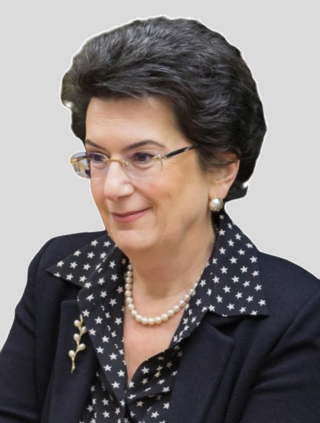
Nino Burjanadze is a Georgian politician and lawyer who served as Chairperson of the Parliament of Georgia from November 2001 to June 2008. As the first woman she has served as the acting head of state of Georgia twice; the first time from 23 November 2003 to 25 January 2004 in the wake of Eduard Shevardnadze's resignation during the Rose Revolution, and again from 25 November 2007 to 20 January 2008, when Mikheil Saakashvili stepped down to rerun in the early presidential elections. She withdrew into opposition to Saakashvili as the leader of the Democratic Movement-United Georgia party in 2008. In October 2013, she ran in the presidential election, competing against 22 candidates. She ended third with 10 percent of the vote.
Zurab Zhvania was a Georgian politician, who served as Prime Minister of Georgia and Speaker of the Parliament of Georgia.

United National Movement is a liberal and pro-western political party in Georgia founded by Mikheil Saakashvili which rose to power following the Rose Revolution. Since the 2012 parliamentary election, it is the main opposition party.

The Union of Citizens of Georgia was a political party established by Eduard Shevardnadze, Communist leader of the Georgian SSR from 1972–1985 and then President of Georgia from 1992–2003, and David Chantladze, former General Trade Representative of the Soviet Union to Czechoslovakia. It was established in the mid-1990s as a vehicle for modernising politicians. It became the majority grouping in the Georgian parliament following the parliamentary elections of November 1995, with Shevardnadze winning the presidency at the same time.
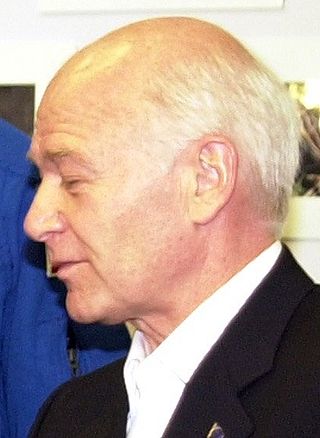
Aslan Abashidze is the former leader of the Ajarian Autonomous Republic in western Georgia. He served in this capacity from 18 August 1991 to May 5, 2004. He resigned under the pressure of the central Georgian government and mass opposition rallies during the 2004 Adjara crisis, and has since lived in Moscow, Russia. On January 22, 2007, the Batumi city court found him guilty of misuse of office and embezzlement of GEL 98.2 million in state funds, and sentenced him to 15 years' imprisonment in absentia. He also faces a charge of murder of his former deputy, Nodar Imnadze, in 1991.
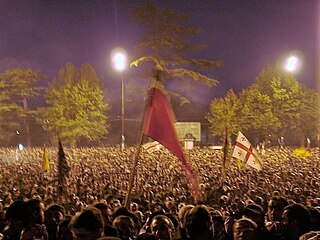
The Rose Revolution or Revolution of Roses was a nonviolent change of power that occurred in Georgia in November 2003. The event was brought about by widespread protests over the disputed parliamentary elections and culminated in the resignation of President Eduard Shevardnadze, which marked the end of the Soviet era leadership in the country. The revolution derives its name from the climactic moment, when demonstrators led by Mikheil Saakashvili stormed the Parliament session with red roses in hand.
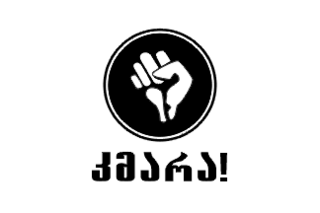
Kmara was a civic youth resistance movement in Georgia, active in the protests prior to and during the November 2003 Rose Revolution, which toppled down the government of Eduard Shevardnadze. Consciously modeled on the Serbian nongovernmental organization (NGO) Otpor!, which had been instrumental in defeating Slobodan Milošević's regime in 2000, the Kmara members were trained and advised by the influential Georgian NGO Liberty Institute and funded by the United States-based Open Society Institute (OSI). The movement was a hybrid of social movement and virtual NGO, which was highly successful in mobilizing the young Georgians, mostly students, against Shevardnadze's rule. Although Kmara was allied with the opposition parties, especially Mikheil Saakashvili's United National Movement, its behavior and tactics were nonpartisan, focusing on criticizing corruption and failures of the Shevardnadze regime, rather than promoting any particular politician or political party.
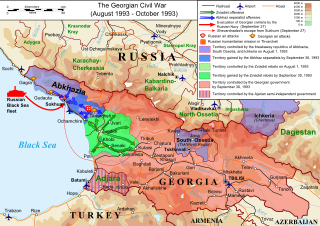
The Georgian Civil War lasted from 1991 to 1993 in the South Caucasian country of Georgia. It consisted of inter-ethnic and international conflicts in the regions of South Ossetia and Abkhazia, as well as the violent military coup d'état against the first democratically-elected President of Georgia, Zviad Gamsakhurdia, and his subsequent uprising in an attempt to regain power.
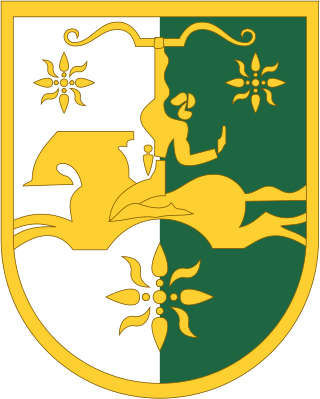
Politics in Abkhazia is dominated by its conflict with Georgia. Abkhazia became de facto independent from Georgia after the 1992–1993 war, but its de jure independence has only been recognised by a few other countries. Abkhazia is a presidential representative democratic republic with a multi-party system, wherein the President is both head of state and head of government. Executive power is exercised by the government of the Republic of Abkhazia. Legislative power is vested in both the government and the People's Assembly of Abkhazia.
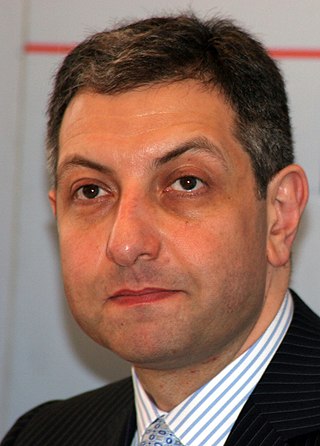
Zurab Nogaideli is a Georgian businessman and a politician who served as the Prime Minister of Georgia from February 2005 until he resigned, citing health problems, on 16 November 2007. In December 2008, Nogaideli withdrew into opposition, setting up the Movement for a Fair Georgia party.

The Adjara crisis, also known as the Adjarian revolution or the Second Rose Revolution, was a political crisis in Georgia's Adjaran Autonomous Republic, then led by Aslan Abashidze, who refused to obey the central authorities after President Eduard Shevardnadze's ouster during the Rose Revolution of November 2003. The crisis threatened to develop into military confrontation as both sides mobilized their forces at the internal border. However, Georgia's post-revolutionary government of President Mikheil Saakashvili managed to avoid bloodshed and with the help of Adjaran opposition reasserted its supremacy. Abashidze left the region in exile in May 2004 and was succeeded by Levan Varshalomidze.

Parliamentary elections were held in Georgia on 21 May 2008. President Mikheil Saakashvili proposed a referendum on bringing them forward from fall to spring after the 2007 Georgian demonstrations. The referendum was held at the same time as the early presidential election on 5 January 2008; the results indicated that voters were largely in favour of having the elections in spring.
2007 in Georgia saw a number of military incidents involving Georgia and Russia over the Abkhazia area. Abkhazia is a partially recognised state within Georgia's territory. In March, Georgia accused Russia of attacking the Kodori Valley in Upper Abkhazia, which was the only area in Abkhazia that Georgia controlled. Russia denied the claims, saying that their aircraft in the area were grounded at the time. In August, Georgia claimed that Russia fired a missile into Georgia. This claim was confirmed by 2 investigation teams but challenged by a Russian investigation team. Also in August, Georgia claimed it shot down Russian aircraft that were in Georgia's airspace over the Georgia-controlled Upper Abkhazia area. Russia denied this claim and Abkhazia said that it was an American or Georgian aircraft that crashed in Abkhazia. Abkhazia also held elections that were not recognised by any countries. The president was Mikheil Saakashvili, who stepped down in November to run in the 2008 elections, which he won, again becoming president and replacing Nino Burjanadze who had been acting president since he stepped down.

The Republican Party of Georgia, commonly known as the Republicans, is a political party in Georgia active since 1978. Until March 2016, the party was a part of the Georgian Dream coalition that won the 2012 election, defeating the United National Movement. Currently it is in opposition to Georgian Dream as part of the UNM-led Strength Is in Unity coalition.
Democratic Movement – United Georgia is a political party in Georgia chaired by Nino Burjanadze; it was founded on 24 November 2008. The secretary-general of the party is Vakhtang Kolbaia.

Gubaz Sanikidze is a Georgian politician, currently serving as a member of the Parliament of Georgia from the United National Movement (UNM) since 2020. A career historian, he was first elected to Georgia's legislature during the 1990 elections that saw the downfall of the Soviet regime, as a member of the conservative Traditionalist Party. Following the Georgian Civil War, his party formed an alliance with the authoritarian leader of Adjara Aslan Abashidze and he was elected to a second term as MP in 1999, during which he became an opponent to President Eduard Shevardnadze. After the rise to power of a new government with the Rose Revolution, he remained in the opposition and lost his seat in 2004, launching with other veteran politicians the National Forum. He briefly served a third term in Parliament in 2008, resigning his seat two weeks after being elected.

Parliamentary elections were held in Georgia on 1 October 2012. The opposition Georgian Dream coalition of billionaire businessman Bidzina Ivanishvili won a majority of the seats. President Mikheil Saakashvili conceded his party's defeat.
Individuals and events related to Georgia in 2021.

Ekaterine "Eka" Kherkheulidze is a Georgian politician who has served as a member of Parliament in 2008–2012, 2015–2016, and since 2020.